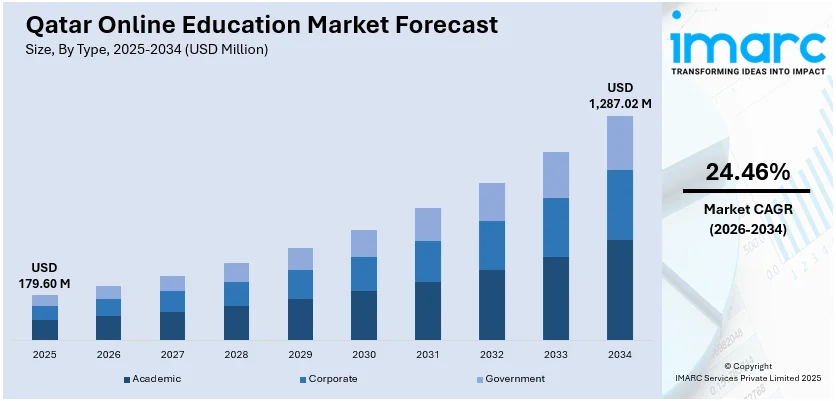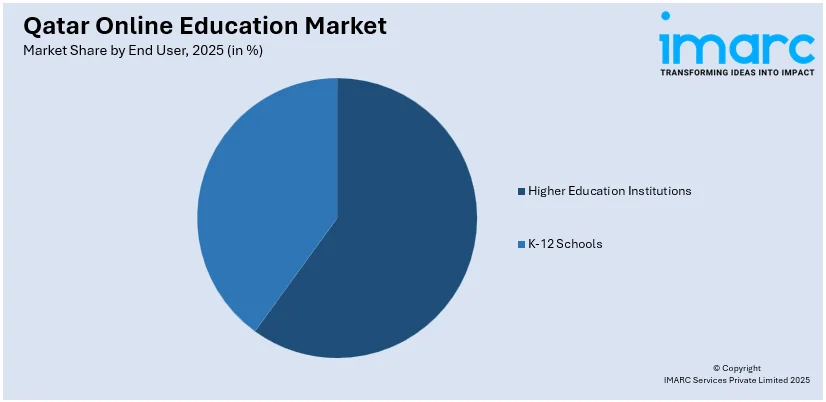
Qatar Online Education Market Size, Share, Trends and Forecast by Type, Provider, Technology, End User, and Region, 2026-2034
Qatar Online Education Market Overview:
The Qatar online education market size reached USD 179.60 Million in 2025. The market is projected to reach USD 1,287.02 Million by 2034, exhibiting a growth rate (CAGR) of 24.46% during 2026-2034. The market is advancing through the integration of digital learning platforms, the rise of professional and skill-based courses, and robust government support. These factors are fostering greater accessibility, flexibility, and inclusivity in education while aligning with national development goals. Learners are increasingly adopting digital tools for career growth and continuous learning. This transformation is creating a strong, technology-driven framework that enhances engagement and expands opportunities across sectors, ultimately strengthening Qatar online education market share.
|
Report Attribute
|
Key Statistics
|
|---|---|
|
Base Year
|
2025
|
|
Forecast Years
|
2026-2034
|
|
Historical Years
|
2020-2025
|
| Market Size in 2025 | USD 179.60 Million |
| Market Forecast in 2034 | USD 1,287.02 Million |
| Market Growth Rate 2026-2034 | 24.46% |
Qatar Online Education Market Trends:
Increased Integration of Digital Learning Solutions
The use of digital learning platforms is revolutionizing the education industry in Qatar. In July 2024, the Higher Learning Commission approved Arkansas State University’s new Doha campus in partnership with Global Studies Institute, allowing students in Qatar to pursue accredited U.S. degree programs through synchronous livestreamed classes. Moreover, advanced online platforms are facilitating engaging and immersive learning processes through video lectures, online libraries, and virtual collaboration environments. These technological advancements are maximizing the accessibility of quality education for students from different age groups and professional levels. Organizations are actively propelling their digital learning capabilities in accordance with contemporary education needs. This change indicates a clear drift towards pedagogy driven by technology, mirroring the broader focus on modernization. With the incorporation of these tools, Qatar is establishing an adaptive and student-oriented environment for learning that fosters ongoing skill acquisition. The increased preference for flexible and technology-dependent solutions is increasingly driving Qatar online education market growth, as students opt for credible, affordable, and interactive substitutes to classroom teaching.

To get more information on this market Request Sample
Growth in Professional and Skill-Based Learning
One of the dominant trends transforming Qatar's education industry is the growing need for professional and skill-oriented online courses. Students are seeking online platforms to gain specialty knowledge in business, engineering, healthcare, and ICT skills. This is motivated by career progression, upskilling, and the necessity to stay competitive in an increasingly dynamic job market. Employers, too, are realizing the benefit of such programs, as they offer employees specialized training opportunities that are aligned with industry needs. Online certification programs are also enhancing the credibility of online education and promoting lifelong learning practices. This growth is establishing a strong digital ecosystem that is enabling personal and professional development. The increasing focus on skills building and online qualifications indicates a dynamic landscape driving market trend, where learning online continues to supplement and expand conventional education streams.
Government Support and Policy Initiatives
Government efforts are instrumental in pushing the adoption of online education in Qatar forward. Thoughtful policies and investments in digital infrastructure are promoting inclusive and accessible education for citizens and expatriates. These initiatives highlight the significance of e-learning towards sustained national development objectives. By promoting digital platforms within schools, colleges, and training schools, the government is facilitating the creation of a blended approach that combines conventional and web-based methods. These initiatives ensure that learning opportunities transcend geographic and institutional limitations, supporting evenness in access to learning resources. Furthermore, research support through policy, digital content development, and innovative teaching approaches further enhances the industry's long-term viability. While expanding further, these programs are promoting innovation and increasing engagement in every learner segment, placing Qatar online education market trends at center stage as an inducer of modernization and national advancement.
Qatar Online Education Market Segmentation:
IMARC Group provides an analysis of the key trends in each segment of the market, along with forecasts at the country and regional levels for 2026-2034. Our report has categorized the market based on type, provider, technology, and end user.
Type Insights:
- Academic
- Higher Education
- Vocational Training
- K-12 Education
- Corporate
- Large Enterprises
- SMBs
- Government
The report has provided a detailed breakup and analysis of the market based on the type. This includes academic (higher education, vocational training, and K-12 education), corporate (large enterprises and SMBs), and government.
Provider Insights:
- Content
- Services
A detailed breakup and analysis of the market based on the provider have also been provided in the report. This includes content and services.
Technology Insights:
- Mobile E-Learning
- Rapid E-Learning
- Virtual Classroom
- Others
The report has provided a detailed breakup and analysis of the market based on the technology. This includes mobile e-learning, rapid e-learning, virtual classroom, and others.
End User Insights:

Access the comprehensive market breakdown Request Sample
- Higher Education Institutions
- K-12 Schools
A detailed breakup and analysis of the market based on the end user have also been provided in the report. This includes higher education institutions and K-12 schools.
Regional Insights:
- Ad Dawhah
- Al Rayyan
- Al Wakrah
- Others
The report has also provided a comprehensive analysis of all the major regional markets, which include Ad Dawhah, Al Rayyan, Al Wakrah, and others.
Competitive Landscape:
The market research report has also provided a comprehensive analysis of the competitive landscape. Competitive analysis such as market structure, key player positioning, top winning strategies, competitive dashboard, and company evaluation quadrant has been covered in the report. Also, detailed profiles of all major companies have been provided.
Qatar Online Education Market News:
- December 2024: Qatar University introduced a free Arabic language course on edX through its Arabic for Non-Native Speakers Centre. Launched alongside World Arabic Language Day, the program supports global Arabic learning, enhances digital education access, and strengthens cultural exchange, highlighting Qatar’s commitment to innovative, flexible online education.
- April 2024: Qatar Chamber partnered with Pioneers Training Centre to establish an AI-powered electronic training platform. The platform will offer specialized e-training in fields like IT, engineering, and administration, aiming to strengthen Qatar’s private sector, enhance workforce skills, and promote advanced digital learning opportunities nationwide.
Qatar Online Education Market Report Coverage:
| Report Features | Details |
|---|---|
| Base Year of the Analysis | 2025 |
| Historical Period | 2020-2025 |
| Forecast Period | 2026-2034 |
| Units | Million USD |
| Scope of the Report |
Exploration of Historical Trends and Market Outlook, Industry Catalysts and Challenges, Segment-Wise Historical and Future Market Assessment:
|
| Types Covered |
|
| Providers Covered | Content, Services |
| Technologies Covered | Mobile E-Learning, Rapid E-Learning, Virtual Classroom, Others |
| End Users Covered | Higher Education Institutions, K-12 Schools |
| Regions Covered | Ad Dawhah, Al Rayyan, Al Wakrah, Others |
| Customization Scope | 10% Free Customization |
| Post-Sale Analyst Support | 10-12 Weeks |
| Delivery Format | PDF and Excel through Email (We can also provide the editable version of the report in PPT/Word format on special request) |
Key Questions Answered in This Report:
- How has the Qatar online education market performed so far and how will it perform in the coming years?
- What is the breakup of the Qatar online education market on the basis of type?
- What is the breakup of the Qatar online education market on the basis of provider?
- What is the breakup of the Qatar online education market on the basis of technology?
- What is the breakup of the Qatar online education market on the basis of end user?
- What is the breakup of the Qatar online education market on the basis of region?
- What are the various stages in the value chain of the Qatar online education market?
- What are the key driving factors and challenges in the Qatar online education market?
- What is the structure of the Qatar online education market and who are the key players?
- What is the degree of competition in the Qatar online education market?
Key Benefits for Stakeholders:
- IMARC's industry report offers a comprehensive quantitative analysis of various market segments, historical and current market trends, market forecasts, and dynamics of the Qatar online education market from 2020-2034.
- The research report provides the latest information on the market drivers, challenges, and opportunities in the Qatar online education market.
- Porter's five forces analysis assist stakeholders in assessing the impact of new entrants, competitive rivalry, supplier power, buyer power, and the threat of substitution. It helps stakeholders to analyze the level of competition within the Qatar online education industry and its attractiveness.
- Competitive landscape allows stakeholders to understand their competitive environment and provides an insight into the current positions of key players in the market.
Need more help?
- Speak to our experienced analysts for insights on the current market scenarios.
- Include additional segments and countries to customize the report as per your requirement.
- Gain an unparalleled competitive advantage in your domain by understanding how to utilize the report and positively impacting your operations and revenue.
- For further assistance, please connect with our analysts.
 Request Customization
Request Customization
 Speak to an Analyst
Speak to an Analyst
 Request Brochure
Request Brochure
 Inquire Before Buying
Inquire Before Buying




.webp)




.webp)












